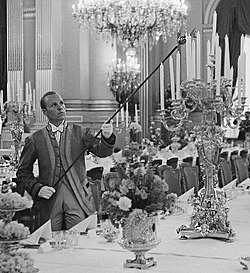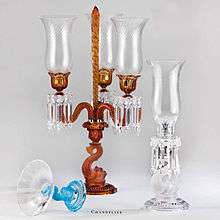Candelabra
A candelabrum /ˌkændəlˈɑːbrəm, -æbrəm/ (plural candelabrums, candelabra, candelabras),[1] sometimes called a candle tree, is a candle holder with multiple arms. The word comes from Latin.[2][3]


In modern usage the plural form "candelabra" is frequently used in the singular sense. Although the electrification of indoor lighting has relegated candleholders to the status of backup light sources in most homes and other buildings, interior designers continue to model light fixtures and lighting accessories after candelabra and candlesticks. Accordingly, the term "candelabra" has entered common use as a collective term for small-based incandescent light bulbs used in chandeliers and other lighting fixtures made for decoration as well as lighting.
In Judaism and the Philippine church Iglesia ni Cristo, the menorah is a special kind of candelabrum.

Candelabra antennas
In the United States and Canada, the plural term candelabra is a nickname for radio masts and towers with multiple transmission antennas. Baltimore's TV stations, WMAR-TV, WBAL-TV, and WJZ-TV in 1959 built the world’s first three-antenna candelabra tower, 730 feet tall. Other examples include the Mount Royal Candelabra in Montreal, the KXTV/KOVR/KCRA Tower, KSMO Candelabra Tower, KMBC/KCWE Candelabra Tower, the Madison Community Candelabra Tower in Madison, and Sutro Tower in San Francisco.
See also
- Candlestick
- Chandelier
- Girandole
- Julleuchter
- Ljuskrona
- Menorah
- Charlottenburg Candelabra a pair of ornamental colonnades in west Berlin with a passing resemblance to candelabra
- Radio masts and towers
References
- Shorter Oxford English dictionary, 6th ed. United Kingdom: Oxford University Press. 2007. p. 3804. ISBN 0199206872.
- "candelabra". Merriam-Webster. Retrieved 6 October 2014.
- "Candelabra - Define Candelabra at Dictionary.com". Dictionary.com. Retrieved 8 October 2014.
External links
| Wikimedia Commons has media related to Candelabras. |
- Chisholm, Hugh, ed. (1911). . Encyclopædia Britannica (11th ed.). Cambridge University Press.